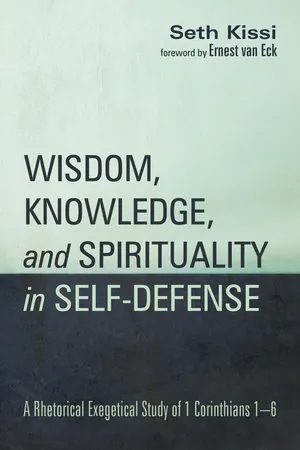
Wisdom, Knowledge, and Spirituality in Self-defense
A Rhetorical Exegetical Study of 1 Corinthians 1–6
- 202 pages
- English
- ePUB (mobile friendly)
- Available on iOS & Android
Wisdom, Knowledge, and Spirituality in Self-defense
A Rhetorical Exegetical Study of 1 Corinthians 1–6
About this book
Most of the challenges today's church is experiencing were experienced by the early church in New Testament times. Knowing this makes it possible to handle the challenges of today more effectively and in a way in which perplexity gives way to sober and informed attitudes. This book brings to the fore the role human sentiments within relational and ministerial dynamics play in creating problems of strife, rivalry, and unhealthy competition among leaders and members of the church, and provides opportunity to reflect on how to stem such negative tendencies. The study reveals the coherence of Paul's arguments in places where many existing commentaries find him digressing. Its focus on Paul's rhetorical strategies and the Greek text helps to clarify a number of issues that remain puzzles in many commentaries. The book also highlights clues in Paul's argument that indicate the direction, the interpretative frame, and the intended rhetorical effect of his arguments, avoiding the unhealthy imposition of general Pauline views on some statements in 1 Corinthians, as found in many books on the market. These, against insightful background in pluralism and complexity of wisdom, knowledge, oratory, persuasion, and inspiration, offer useful lenses that make Paul's argument consistently and coherently meaningful.
Frequently asked questions
- Essential is ideal for learners and professionals who enjoy exploring a wide range of subjects. Access the Essential Library with 800,000+ trusted titles and best-sellers across business, personal growth, and the humanities. Includes unlimited reading time and Standard Read Aloud voice.
- Complete: Perfect for advanced learners and researchers needing full, unrestricted access. Unlock 1.4M+ books across hundreds of subjects, including academic and specialized titles. The Complete Plan also includes advanced features like Premium Read Aloud and Research Assistant.
Please note we cannot support devices running on iOS 13 and Android 7 or earlier. Learn more about using the app.
Information
Introduction
Table of contents
- Title Page
- Foreword
- Preface
- Acknowledgements
- Chapter 1: Introduction
- Chapter 2: Salutation, Thanksgiving, and Schism
- Chapter 3: Paul’s Rated Image and Determinants of a Spiritual Person
- Chapter 4: Counter Assessment, Correction, and Exhortation
- Chapter 5: Correction of Wrong Perception and Further Judgment
- Chapter 6: Sexual Immorality as Evidence of Lack of Sound Knowledge and Spirituality
- Chapter 7: Lawsuits among the Corinthians —A Sign of Spiritual Degeneracy
- Chapter 8: Concluding Remarks on 1 Corinthians 1–6
- Glossary
- Bibliography